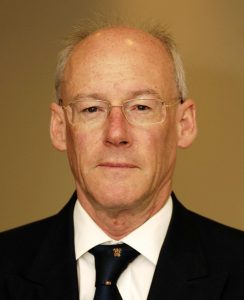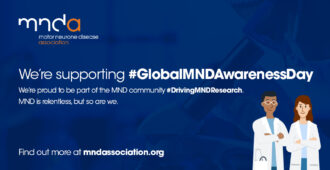This week is Volunteering week and we’re celebrating volunteering on our MND Research blog for our ‘blog a day’. Peter Bickley is an MND Association trustee and member of our Biomedical Research Advisory Panel (BRAP). Here he blogs about his role as a voluntary Trustee and what it’s like to be part of BRAP.
Until 2001 I had never heard of MND. Then, after the usual delay and uncertainty, my father was diagnosed with this unfamiliar disease; he died in 2002. The MND Association did not feature prominently during his illness, not through want of trying but because he simply did not want to know; this is not unusual, it is understandable but having seen it in action I am sure it is mistaken. So the efforts of the MND Association at the time were appreciated by those of us around him and the Association came onto my radar as a charity to support which, in a modest way, I did.
Becoming a Trustee
Time passed, but someone at the MND Association was doing their homework, finding out about me and my background in finance; meanwhile my career was nearing an end and I had ill-developed ambitions to ‘give something back’ in the charitable arena. So to be approached to join the Trustee Board of the MND Association was simply perfect.
We Trustees are a mixed bunch; happily so since none of us can be expert at every one of the complex issues we face in steering this splendid organisation. It took me probably a full year to find my feet – and to stop getting stressed (or embarrassed) about stuff I couldn’t really grasp. So I settled into contributing where I could, serving on the Finance and Governance Committees and, to be honest, enjoying it a lot. Find out more about becoming a trustee here.
Board papers routinely included an item or two from ‘BRAP’, the Biomedical Research Advisory Panel. This struck me as seriously lofty stuff that, as a mere financially-oriented mortal, I could not and probably should not understand. And yet it exercised a certain fascination, not least thanks to the enthusiasm and explanatory prowess of one Dr Brian Dickie. There are seats for two Trustees on the BRAP; surely these had to be for those with suitable scientific or medical backgrounds, not for a History graduate and life-long number-cruncher like me? No, actually, as we shall see.
By chance, a BRAP meeting loomed with no Trustee available to attend; by happier chance I was in the right place at the right time and volunteered to occupy a seat, warning all and sundry of my unsuitability. I was treated gently by our excellent chairman (to whom grateful thanks!) and was promptly hooked. At the subsequent round of Committee elections I put myself forward to become a regular BRAP member and, to my mild astonishment, colleagues let me through.
Trustee representatives on BRAP are not there to be scientific experts. We do not vote, we do not take part in the ‘scoring’ process and we are not there to second-guess the professional expertise of our much wiser colleagues. But we are not mere baggage; we have an important role to play.
The Association funds a large number of research projects and the sums of money involved are considerable. At the latest meeting this April we agreed funding for projects totalling close to £2,000,000, the total being inflated by one particularly large award. The way that BRAP reaches its decisions has to be absolutely transparent, robust, impartial and honest. Integrity is all and the Trustee representatives are there to see that the process passes all of these tests. The full Trustee Board depends on us.
On top of that we are there to ensure that project approvals are consistent with the Association’s objectives and that the order of priorities is appropriate. The line between success and failure for high quality applications is often a very fine one indeed; it is right that Trustees have a direct input into the deliberations.
This means lots of work; we have to understand the principles of each application (lay abstracts do help here) and to study and reflect on the detailed comments of the referees who have generously given their time and expertise to pick them apart. And then there is the meeting…
The Panel
Fill a room with people at the very top of their professions, absolute leaders in their field, and you might expect chaos. Not at BRAP; calmly and good-humouredly the Panel considered and judged 22 applications, giving each its due respect and still finishing on time. For this novice Panel member that might have been awesome enough, were it not for the insight into the outstanding, exciting and cutting-edge research that so many top-notch specialists are conducting. It is, quite simply, stunning. Membership of BRAP isn’t a task, it’s an honour and I am so delighted to have been given this opportunity.




Hi I have this fun disease if I can be any assistance for research please contact me thank you Alexa Marshall